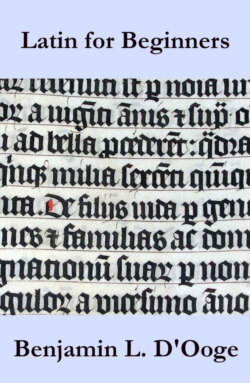Читать книгу Latin for Beginners - BENJAMIN L. D’OOGE - Страница 38
На сайте Литреса книга снята с продажи.
LESSON IX THE SECOND OR O-DECLENSION
Оглавление[Special Vocabulary]
NOUNS
«bellum, -ī», n., war (re-bel) «cōnstantia, -ae», f., firmness, constancy, steadiness dominus, -ī, m., master, lord (dominate) «equus, -ī», m., horse (equine) «frūmentum, -ī», n., grain «lēgātus, -ī», m., lieutenant, ambassador (legate) «Mārcus, -ī», m., Marcus, Mark «mūrus, -ī», m., wall (mural) «oppidānus, -ī», m., townsman «oppidum, -ī», n., town «pīlum, -ī», n., spear (pile driver) «servus, -ī», m., slave, servant Sextus, -ī, m., Sextus
VERBS
«cūrat», he (she, it) cares for, with acc. «properat», he (she, it) hastens
«70.» Latin nouns are divided into five declensions.
The declension to which a noun belongs is shown by the ending of the genitive singular. This should always be learned along with the nominative and the gender.
«71.» The nominative singular of nouns of the Second or O-Declension ends in «-us», «-er», «-ir», or «-um». The genitive singular ends in «-ī».
«72.» «Gender.» Nouns in «-um» are neuter. The others are regularly masculine.
«73.» «Declension of nouns in -us and -um.» Masculines in «-us» and neuters in «-um» are declined as follows:
«dominus» (base «domin-»), «pīlum» (base «pīl-»),
m., master n., spear
TERMINATIONS TERMINATIONS
SINGULAR
Nom. do´minus[1] -us pīlum -um Gen. dominī -ī pīlī -ī Dat. dominō -ō pīlō -ō Acc. dominum -um pīlum -um Abl. dominō -ō pīlō -ō Voc. domine -e pīlum -um
PLURAL
Nom. dominī -ī pīla -a Gen. dominō´rum -ōrum pīlō´rum -ōrum Dat. dominīs -īs pīlīs -īs Acc. dominōs -ōs pīla -a Abl. dominīs -īs pīlīs -īs
[Footnote 1: Compare the declension of «domina» and of «dominus».]
a. Observe that the masculines and the neuters have the same terminations excepting in the nominative singular and the nominative and accusative plural.
b. The vocative singular of words of the second declension in «-us» ends in «-ĕ», as «domine», O master; «serve», O slave. This is the most important exception to the rule in §56.a.
«74.» Write side by side the declension of «domina», «dominus», and «pīlum». A comparison of the forms will lead to the following rules, which are of great importance because they apply to all five declensions:
a. The vocative, with a single exception (see §73.b), is like the nominative. That is, the vocative singular is like the nominative singular, and the vocative plural is like the nominative plural.
b. The nominative, accusative, and vocative of neuter nouns are alike, and in the plural end in «-a».
c. The accusative singular of masculines and feminines ends in «-m» and the accusative plural in «-s».
d. The dative and ablative plural are always alike.
e. Final «-i» and «-o» are always long; final «-a» is short, except in the ablative singular of the first declension.
«75.» Observe the sentences
«Lesbia est bona»,
Lesbia is good «Lesbia est ancilla», Lesbia is a maidservant
We have learned (§55) that «bona», when used, as here, in the predicate to describe the subject, is called a predicate adjective. Similarly a noun, as «ancilla», used in the predicate to define the subject is called a «predicate noun».
«76.» RULE. «Predicate Noun.» A predicate noun agrees in case with the subject of the verb.
[Illustration: PILA]
